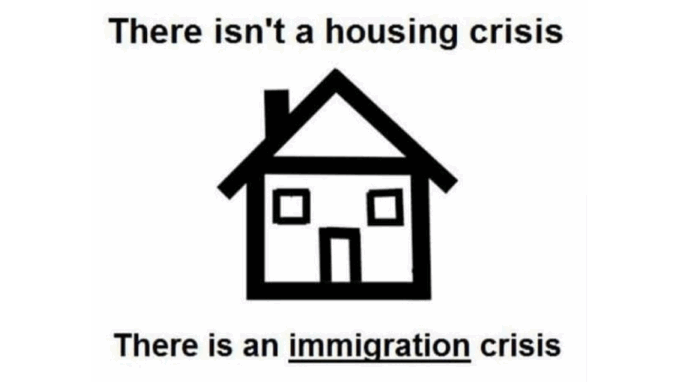
10 million immigrants officially have increased the U.K. population, the true figure will of course be higher, no one has ever voted for this, one of the results of this invasion apart from the pressure on school places, health care, quality of life has been accommodation, This RRB being pushed through is aimed at punishing people for being property owners and I understand there is more to come in the way of proposed further taxation on property owners. We will see in the meantime below is a roundup of some but not all of the further legislation which the bill will impose on LLords.
More Stringent Safety Standards – New rules under the bill, such as Awaab’s Law and the Decent Homes Standard, will require landlords to meet the increasingly more stringent Energy Performance Certificate (EPC) and Safety (HHSRS) requirements. These will be tightened, pushing landlords to improve energy efficiency, address damp and mould issues, and other safety requirements within a fixed timeframe.
Restrictions on rent increases – Thankfully, the government does not support the introduction of rent controls, and nothing in the bill restricts landlords raising rents in line with market prices. Under the new rules all private rented sector rent increases will be restricted to once every 12 months and must be made using the statutory Section 13 process, as amended by the bill.
Landlords will be required to use a simplified Section 13 form, which will be published on the GOV.UK website, and serve this on the tenant. If the tenant accepts the proposed rent increase, they simply need to pay the new amount on the next rent day. But, a tenant can dispute the increase by applying to the First-tier Tribunal (property chamber) before the starting date of the proposed new rent, notifying their landlord of their intention.
Landlords will be well advised to increase rents in-line with market values on an annual basis. It’s something that tenants will come to accept but it will work against them long—term as many landlords refrained from regular increases under the AST.
Rent payments in advance – payments in advance of the start of the tenancy “the initial rent” will be allowed providing this is taken after the agreement is signed. This is in the “pre-tenancy period” and rent taken cannot exceed one month’s rent. The rent periods are to be restricted to one month and no more than one month’s rent can be taken at any one time. The first payment may be less than one month to align a payment date.
An end to blanket bans – landlords cannot automatically refuse tenants with children or those claiming benefits, and there’s a right for tenants to request pets. It means there is potentially a higher risk of taking on problematic tenants and an increased need for more stringent tenant selection and rent and legal insurance cover and referencing.
The Renters’ Rights Bill guidance says that the bill will, “take direct action to address rental discrimination practices in the private rented sector. It will address both overt discriminatory practices, such as ‘No DSS’ adverts, and situations where landlords or letting agents use other indirect practices in order to prevent someone entering into a tenancy.”
However, it also says that: “landlords and agents will continue to have the final say on who they let their property to and can carry out referencing checks to make sure tenancies are sustainable for all parties. They will be able to do this based on affordability, but not on the basis the prospective tenant has children or is in receipt of benefits.”
Property Ombudsman Scheme – The bill proposes a new, mandatory Private Rented Sector Ombudsman to address disputes between landlords and tenants. It is designed to offer a faster and more affordable alternative to court proceedings. The new ombudsman scheme will cover all private landlords and provide fair, impartial, and binding resolution to issues like property standards, repairs, and poor landlord practices.
Private Rented Sector Database and Portal – a new database of all landlords of assured and regulated tenancies who are legally required to register themselves and their properties on the database will be created. Landlords will be subject to strict penalties if they market or let out a property without registering it and providing the required information.
The idea is that the portal will provide a ‘one stop shop’ for landlords allowing them to access relevant government guidance on letting practices helping them to understand and fully comply with their legal obligations.
The database will be accessible by tenants, “increasing transparency and making the information available before they decide to rent a property and throughout their renting journey. This will allow them to take effective action to enforce their rights and be aware when they can escalate issues with their property to their local council or the Private Rented Sector Ombudsman,” says the guidance.
The database will also, “provide local councils with more data about private rented sector properties. One of the biggest and most time-consuming barriers faced by local councils is identifying poor quality and non-compliant private rented sector properties and who owns them. The database will provide a trusted and consistent intelligence source which will remove unnecessary, frustrating administration, meaning council staff will be able to focus on enforcement against criminal landlords.”
Mandatory membership in an ombudsman scheme – for which all private landlords in England with assured or regulated tenancies will be required by law to join, including those who use a managing agent. Tenants will be able to use the service for free to complain about a landlords’ actions or behaviours and landlords will be required to comply with ombudsman decisions.
Local councils will be able to act against landlords who fail to join, or against anyone who markets a PRS property where the landlord is not registered. This will include civil penalties of up to £7,000 for initial breaches and up to £40,000 or criminal prosecution for continuing or repeated breaches. Tenants will be able to seek rent repayment orders against their landlord if the landlord commits an offence by persistently failing to join the ombudsman service.
Strengthened rent repayment orders – and other fines and penalties are to increase. Rent repayment orders will be extended to superior landlords, doubling the maximum penalty and ensuring repeat offenders must repay the maximum amount. It means that landlords who rent out their properties for others to manage (typically rent-to-rent arrangements) will still be responsible for the failings of the management company, either jointly or wholly.
Rent in advance and guarantors – these are two common mitigation strategies for landlords, particularly in the student market. Under the new rules landlords will be limited to asking for one month’s rent in advance, as well as a security deposit not exceeding 5 weeks rent. They will no longer be allowed to demand multiple months’ rent in advance or rent upfront.
Guarantors will have more protection under the bill. A key change is that guarantors who are related to the tenant will no longer be liable for outstanding rent if the tenant dies. This aims to alleviate the burden on family members who might otherwise inherit a tenant’s rental debt.
Heavy Weather 2025



